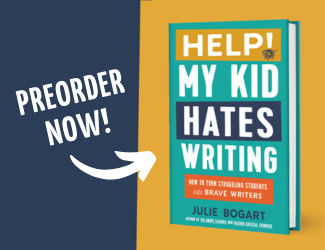Brave Writer Podcast: Developing Cultural Literacy & Empathy Through Books with Sarita Holzmann

Back in the endarkenment, pre-Internet, before books had wings to fly across oceans and continents through pixels, those of us living on the other side of the globe had text books—shipped to us in big military duffel bags, waiting up to six months for the ocean liners to arrive, then a long journey through customs before we could read them to our kids.
[This post contains Amazon affiliate links. When you click on those links to make purchases,
Brave Writer receives compensation at no extra cost to you. Thank you!]
To hold a real, complete novel or picture book in English in your hands felt like a visit from Santa Claus—so few were there that made it around the globe. The sacred texts would then be carefully shuttled up and down the country between families, courier to courier accompanied by exclamations of how marvelous Jumanji was to read or how wonderful it was to spend a week with Anne of Green Gables.
No libraries. No English book stores. Just a careful, gingerly constructed pony-express between ex-patriates wishing to read to their children all the books they remembered from their well-endowed library-laden childhoods.
It is with this background that I hope you listen to today’s podcast. My relationship to Sarita Holzmann and to Sonlight curriculum goes all the way back to before the beginning—to solving the problem of how to help kids living abroad have a rich literary experience even when they live outside their host countries.
Plus Sarita is just delightful and shares my passion to create global citizens in the world—people who care as much about the Rohingya as they do their neighbors.
Hope you’ll tune in! It’s a good one.
Sarita’s 7 Factors of Exemplary Books
There are a lot of books that are just okay – they won’t actively hurt our kids – but some are downright exemplary, and those are the books that Sarita wants to include in her curricula. To narrow it down, Sarita looks for seven things:
- Real or realistic characters
- Solid character development
- A contribution to the reader’s cultural literacy
- An intriguing or multi-dimensional plot
- Something that is emotionally compelling, or grips your soul
- Beautiful prose
- Re-readability
The Global Perspective
You don’t have to actually visit every country on the planet to expand your horizons. You can get there – for free! – through the pages of a good book.
- As you read about children and their parents, you discover that families around the world desire the same things: food, shelter, schooling, and the best for their children.
- Books help us learn vicariously. Your children may not experience gang violence in your neighborhood, but they can start to gain an understanding of the complexities of racism and gangs in a book like The Outsiders.
- Books help us develop empathy, and empathizing with characters in a variety of settings and places aids us develop this skill in real life. When we encounter people from other cultures and backgrounds, we will be better equipped to appreciate, take interest in, and have respect for cultural differences.
- We can develop a sense of compassion (versus entitlement) as we see how the vast majority of the world lives.
Would you please post a review on Apple Podcasts for us?
Help a homeschooler like you find more joy in the journey. Thanks!


















